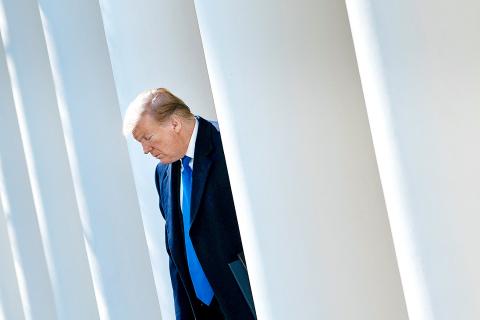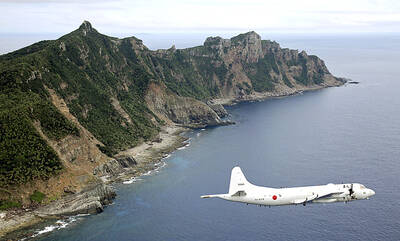US President Donald Trump on Friday declared a national emergency along the border with Mexico and predicted that his administration would end up defending it all the way to the US Supreme Court.
That might have been the only thing he said that produced near-universal agreement.
The American Civil Liberties Union announced its intention to sue less than an hour after the White House released the text of Trump’s declaration that the “current situation at the southern border presents a border security and humanitarian crisis that threatens core national security interests and constitutes a national emergency.”

Photo: AFP
Nonprofit watchdog group Public Citizen filed suit later, urging the US District Court for the District of Columbia to “bar Trump and the US Department of Defense from using the declaration and funds appropriated for other purposes to build a border wall.”
US House of Representatives Speaker Nancy Pelosi and several Democratic state attorneys general have already said that they might go to court.
The coming legal fight seems likely to hinge on two main issues: Can the US president declare a national emergency to build a border wall in the face of the US Congress’ refusal to give him all the money he wanted and, under the federal law Trump invoked in his declaration, can the department take money from some congressionally approved military construction projects to pay for wall construction?
The Pentagon has not said which projects might be affected.
However, after weeks of publicly ruminating whether to act, Trump’s signature on the declaration set in motion a quick march to the courthouse.
Trump relied on the National Emergencies Act of 1976, which Congress adopted as a way to put some limits on presidential use of national emergencies.
The act requires a US president to notify Congress publicly of the national emergency and to report every six months.
The law also says the president must renew the emergency every year, simply by notifying Congress.
The House and the US Senate can also revoke a declaration by majority vote, although it would take a two-thirds vote by each house to override an expected presidential veto.
Beyond that, the law does not say what constitutes a national emergency or impose any other limits on the president.
The broad grant of discretion to the president could make it hard to persuade courts to rule that Trump exceeded his authority in declaring a border emergency.
“He’s the one who gets to make the call. We can’t second-guess it,” said John Eastman, a professor of constitutional law at Chapman University’s School of Law.
Courts are often reluctant to look beyond the justifications the US president included in his proclamation, Ohio State University law professor Peter Shane said on a call organized by the liberal American Constitution Society.
However, other legal experts said that the facts are powerfully arrayed against the president.
They include government statistics showing a decades-long decline in illegal border crossings, as well as Trump’s rejection of a deal last year that would have provided more than the nearly US$1.4 billion he got for border security in a budget agreement he signed on Thursday.
Opponents of the declaration are also certain to use Trump’s own words at his Rose Garden news conference on Friday to argue that there is no emergency on the border.
“I could do the wall over a longer period of time,” Trump said. “I didn’t need to do this, but I’d rather do it much faster.”
US Representative Justin Amash, a Republican, said Congress made a conscious choice not to give Trump what he wanted.
“A prerequisite for declaring an emergency is that the situation requires immediate action and Congress does not have an opportunity to act,” Amash said on Twitter.

MISINFORMATION: The generated content tends to adopt China’s official stance, such as ‘Taiwan is currently governed by the Chinese central government,’ the NSB said Five China-developed artificial intelligence (AI) language models exhibit cybersecurity risks and content biases, an inspection conducted by the National Security Bureau (NSB) showed. The five AI tools are: DeepSeek, Doubao (豆包), Yiyan (文心一言), Tongyi (通義千問) and Yuanbao (騰訊元寶), the bureau said, advising people to remain vigilant to protect personal data privacy and corporate business secrets. The NSB said it, in accordance with the National Intelligence Services Act (國家情報工作法), has reviewed international cybersecurity reports and intelligence, and coordinated with the Ministry of Justice Investigation Bureau and the National Police Agency’s Criminal Investigation Bureau to conduct an inspection of China-made AI language

LIMITS: While China increases military pressure on Taiwan and expands its use of cognitive warfare, it is unwilling to target tech supply chains, the report said US and Taiwan military officials have warned that the Chinese People’s Liberation Army (PLA) could implement a blockade within “a matter of hours” and need only “minimal conversion time” prior to an attack on Taiwan, a report released on Tuesday by the US Senate’s China Economic and Security Review Commission said. “While there is no indication that China is planning an imminent attack, the United States and its allies and partners can no longer assume that a Taiwan contingency is a distant possibility for which they would have ample time to prepare,” it said. The commission made the comments in its annual

‘TROUBLEMAKER’: Most countries believe that it is China — rather than Taiwan — that is undermining regional peace and stability with its coercive tactics, the president said China should restrain itself and refrain from being a troublemaker that sabotages peace and stability in the Indo-Pacific region, President William Lai (賴清德) said yesterday. Lai made the remarks after China Coast Guard vessels sailed into disputed waters off the Senkaku Islands — known as the Diaoyutai Islands (釣魚台) in Taiwan — following a remark Japanese Prime Minister Sanae Takaichi made regarding Taiwan. Takaichi during a parliamentary session on Nov. 7 said that a “Taiwan contingency” involving a Chinese naval blockade could qualify as a “survival-threatening situation” for Japan, and trigger Tokyo’s deployment of its military for defense. Asked about the escalating tensions

DISPUTE: A Chinese official prompted a formal protest from Tokyo by saying that ‘the dirty head that sticks itself out must be cut off,’ after Takaichi’s Taiwan remarks Four armed China Coast Guard vessels yesterday morning sailed through disputed waters controlled by Japan, amid a diplomatic spat following Japanese Prime Minister Sanae Takaichi’s comments on Taiwan. The four ships sailed around the Senkaku Islands — known as the Diaoyutai Islands (釣魚台) to Taiwan, and which Taiwan and China also claim — on Saturday before entering Japanese waters yesterday and left, the Japan Coast Guard said. The China Coast Guard said in a statement that it carried out a “rights enforcement patrol” through the waters and that it was a lawful operation. As of the end of last month,